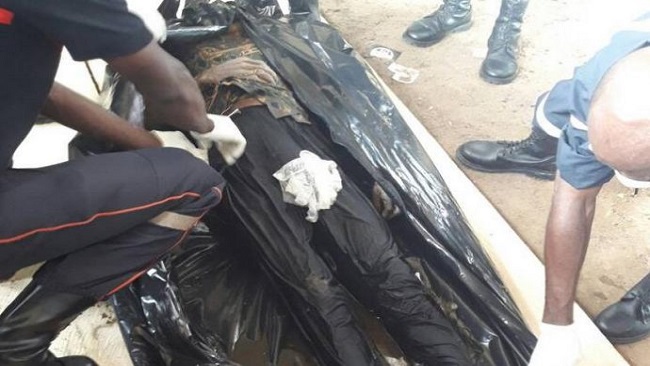Bishop of Bafia killed for resisting gay priests
Ever since the body of Bishop Jean Marie Benoit Bala of Bafia, Cameroon, was discovered in a local river about four miles from where his car had been abandoned, questions have abounded about his death – was it suicide, as the police allege, or a “brutal assassination,” as the country’s bishops insist?
If it was indeed murder, who killed the 58-year-old prelate? In response, the current apostolic administrator of Bala’s diocese, Monsignor Joseph Akonga Essomba, delivered a blunt answer on Thursday during a homily at a memorial Mass: The bishop was killed, he said, because he stood up against homosexuals in the Church and the priesthood.
Pointing to the front rows of the Church where most government ministers and other important personalities sat, and casting a sweeping look at fellow priests and bishops, Essomba charged: “Shame to all those people in black suits and black spectacles always sitting in the front rows of the Church,” he said.
“Shame to all those priests who have come here, pretending to sympathize. These are the people who killed our bishop, because he said ‘no’ to the homosexuality perpetrated by those priests,” Akonga said. He said those who actually killed the bishop were people in positions of power, but it was homosexual priests who betrayed him.
Akonga doubled down on what Cameroon’s bishops have been saying all along – that, contrary to forensic reports purporting that the bishop died by drowning, he was “brutally murdered.” He said Bala was a very good swimmer, and couldn’t have died by drowning. Akonga said the “Catholic Church has come under attack.”
He recalled the line of Cameroon prelates murdered in the past, at least 14 of them, with no one ever giving satisfying accounts of the murders. “They [the Bishop’s killers] are right there in church, and know that this message is for them,” said Jean Pierre Fouman, a Catholic layman based in Bafia, in response to Akonga’s homily. “They are assassins lurking in the dark,” he added.
While Bishop Andrew Nkea of the Mamfe diocese, in Cameroon’s southwest region, said the real reasons for the murder can only be explained by the assassins, his colleague from Kumbo in the northwest region, Bishop George Nkuo, offered a more spiritual explanation.
“The same reasons for which Christ was crucified apply to the killing of the bishop,” he told Crux. “He was killed because he stood for the truth. Any pastor, any bishop, any priest who stands for the truth should be ready to face the sword. It’s a beautiful way to die.”
The Bishop of Obala, Sosthéne Léopold Bayemi, said Bala’s death has strengthened his own faith in Christ, and gives him the “certitude that the rock on which Christ founded his Church will always resist the forces of evil.”
Bala’s nephew, Alexis Bala, stated that his uncle was the “pillar” of the family, and his parting has completely “shattered” their dream. “We pray that God should give us the strength to live through the pain,” he said, before insisting that Bala’s “killers need to be brought to justice.”
The Archbishop of Douala and President of the National Episcopal Conference, Archbishop Samuel Kleda, added a fervent appeal for public authorities to “tell the truth about His Lordship’s death. That’s all we ask for. We need to know who assassinated him.”
Kleda raised concerns that the course of justice was being obstructed, without elaborating on who was doing so. “We denounce all those dark forces obstructing the investigation,” he said, claiming that judges, medical experts and lawyers are under “enormous pressure.”
Around the country and across denominational lines, there has been an outpouring of grief for the late bishop. “We have lost a great pastor, who gave himself to the service of others,” said Jean Paul Ahanda, a resident of Bafia. The Imam of the Bafia Central Mosque, El Hadj Dang Amadou, said that the “the religious community has lost a great prelate, and the Muslim community in Bafia has lost a great friend.”
He recalled several instances when Bala united all denominations to drive home the message that society’s ills can best be resolved if all religions understand there’s more that unites than divides them.
Bala disappeared from his residence on the night of May 31. His car later was found parked on the Sanaga Bridge, a few miles from his residence. A note purportedly written by the bishop saying, “I am in the water,” was found inside the car along with his personal documents.
His corpse was found floating in the river by a Malian fisherman near Monatele on June 2, twelve and a half miles from the bridge. The Cameroon government ordered investigations to determine the cause of the death. Two autopsies were carried out by Cameroonian doctors, but the results were never made public.
Instead, recourse was made to foreign experts. A forensic diagnosis commissioned by INTERPOL and carried out by Professor Michael Tsokos, Director of the Berlin Institute of Forensic Medicine in Germany, and Doctor Mark Mulder, Coordinator of the Disaster Victim Identification Unit of INTERPOL, who arrived in Cameroon on June 29, 2017, came up with the conclusion that the bishop drowned. The bishops, however, have since rejected the report, insisting that they have evidence Bala was “brutally assassinated.”
Source: Cruxnow.com





